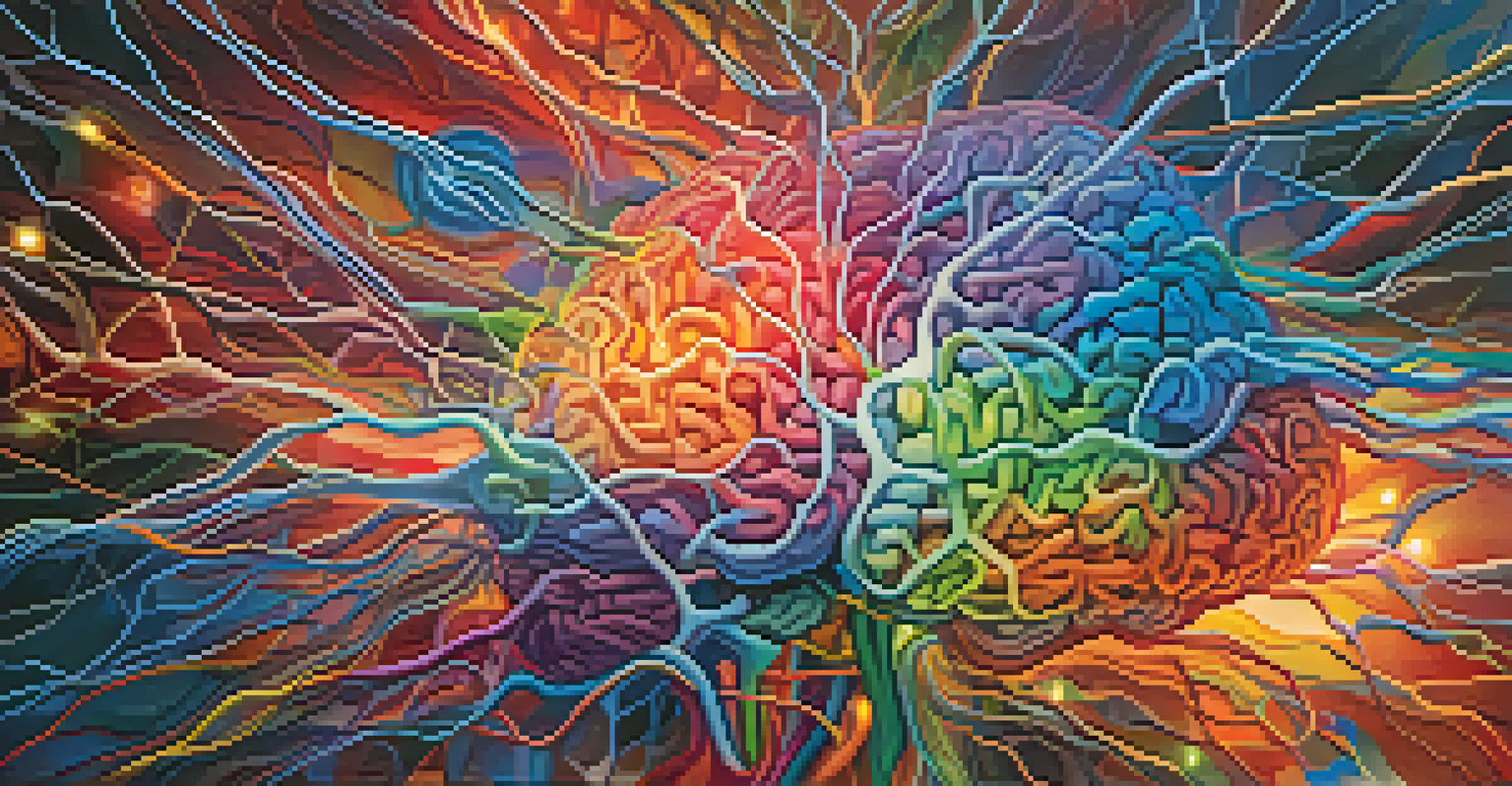The Future of Trauma Treatment: Hallucinogens and Coping

Understanding Trauma and Its Impact on Lives
Trauma can significantly alter an individual’s life, affecting mental and physical health. It often leads to conditions like PTSD, anxiety, and depression, making daily life a challenge. Understanding trauma is essential as it helps to unravel the complexities of human experience.
The greatest glory in living lies not in never falling, but in rising every time we fall.
Imagine carrying a heavy backpack filled with stones; each stone represents a traumatic experience. Over time, the weight can become unbearable, affecting your ability to move forward. In recognizing trauma, we can begin to seek out paths to healing and recovery.
This understanding paves the way for innovative treatment options, including alternative therapies that have been overlooked in traditional medical settings. By acknowledging the weight of trauma, we open ourselves up to exploring new ways to lighten that load.
The Role of Hallucinogens in Modern Therapy
Hallucinogens, such as psilocybin and MDMA, are gaining attention as potential treatments for trauma-related disorders. These substances have been used for centuries in various cultures, often in ceremonial contexts, to promote healing. Recent studies have shown promising results in their ability to help patients process traumatic memories.

The idea might sound surprising; however, when used in controlled environments under professional supervision, hallucinogens can facilitate profound emotional breakthroughs. It's like turning on a light in a dark room, allowing individuals to confront and understand their trauma in a new way.
Understanding Trauma's Weight
Trauma can profoundly impact mental and physical health, making it essential to recognize and address its effects.
Moreover, these substances can enhance neuroplasticity, which is the brain's ability to reorganize itself by forming new neural connections. This means that they may not only help individuals cope with trauma but also assist in rewiring the brain to foster healthier thought patterns.
Research and Evidence Supporting Hallucinogen Use
A growing body of research supports the therapeutic potential of hallucinogens. For instance, clinical trials have demonstrated that psilocybin can significantly reduce symptoms of depression and anxiety in patients with terminal illnesses. These findings are encouraging and suggest that hallucinogens may be effective in treating various trauma-related issues.
Healing takes time, and asking for help is a courageous step.
In one study, participants reported feeling a sense of relief and connection to their experiences after guided sessions with MDMA. This is akin to peeling back layers of an onion, allowing deeper emotional insights to surface. These breakthroughs can be pivotal in a person's healing journey.
The scientific community is beginning to take notice, with increasing funding and interest in psychedelic research. This shift could lead to a new era in mental health treatment, one that embraces alternative methods to help individuals navigate their trauma.
The Importance of Controlled Environments in Therapy
When it comes to using hallucinogens in therapy, the setting and guidance are crucial. A controlled environment, with trained professionals, ensures that individuals can safely explore their emotions without external disturbances. Think of it as a cozy, safe space where you can truly let your guard down.
Therapists often accompany clients during these sessions, providing support and guidance as they navigate intense emotions. This companionship can make a world of difference, akin to having a trusted friend by your side during a challenging journey.
Hallucinogens in Therapy
Emerging research indicates that hallucinogens like psilocybin and MDMA may offer promising therapeutic benefits for trauma-related disorders.
The combination of a safe space and professional guidance allows for a more profound therapeutic experience, increasing the likelihood of positive outcomes. It underscores the importance of structure and safety in exploring potentially life-altering treatments.
Potential Risks and Ethical Considerations
While the benefits of hallucinogens are promising, it's essential to acknowledge the potential risks involved. These substances can trigger intense emotional responses, and not everyone may be ready to confront their trauma. Understanding personal readiness is key to ensuring a beneficial experience.
Ethical considerations also come into play, particularly regarding accessibility and regulation. As interest in these treatments grows, we must ensure that they are available to those who need them most, without falling into the traps of commercialization or misuse.
Additionally, ongoing education for therapists and practitioners is vital to provide safe and effective treatment. Establishing clear guidelines can help navigate the complexities of integrating hallucinogens into therapeutic practices.
Personal Stories of Recovery with Hallucinogens
Many individuals have started to share their personal stories of healing through hallucinogen-assisted therapy. These narratives provide powerful testimonials about overcoming trauma and finding hope. For instance, some have described feeling freed from the shackles of past experiences, as if a weight had been lifted.
These accounts often highlight how hallucinogens helped them unlock repressed memories and emotions, leading to profound insights. It's like finally finding the missing puzzle piece that helps complete the picture of their life.
Future of Trauma Treatment
The integration of alternative therapies, including hallucinogens, could revolutionize trauma treatment, offering more holistic and personalized options for recovery.
Such stories not only inspire others but also emphasize the transformative potential of these treatments. They remind us that healing is possible and that new paths can emerge from even the darkest experiences.
The Future Landscape of Trauma Treatment
As we look ahead, the future of trauma treatment may very well include hallucinogens as a standard option. This shift could lead to a more holistic approach to mental health, integrating traditional and alternative methods. Imagine a world where individuals have access to various therapeutic options tailored to their unique needs.
With ongoing research and a growing acceptance of alternative therapies, we are on the cusp of a mental health revolution. This could change the way we view trauma and its treatment, moving beyond conventional methods and embracing innovative solutions.

Ultimately, the future of trauma treatment is about empowerment and choice. By exploring all available options, individuals can find the paths that resonate with them, leading to genuine healing and recovery.